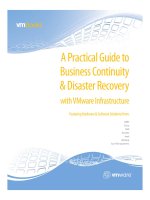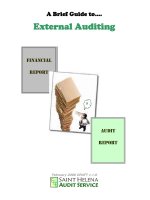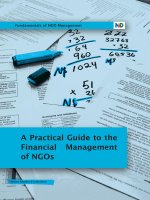A Brief Guide to… External Auditing docx
Bạn đang xem bản rút gọn của tài liệu. Xem và tải ngay bản đầy đủ của tài liệu tại đây (121.73 KB, 4 trang )
FINANCIAL
REPORT
FINANCIAL
REPORT
A Brief Guide to….
External Auditing
February 2006 DRAFT v.1.0
AUDIT
REPORT
?
v. 1.0 – February 2006 Document: External Auditing Guide.doc
A brief guide to…. External Auditing Page 2
“……
opinio
n
…
”
An opinion may be
referred to as
qualified
(accounts
do not
present a true
and fair view) or
unqualified
(no
significant concerns)
What is EXTERNAL AUDITING?
“
An examination of the annual financial report of an organisation by
s
omeone independent of that organisation……….”
“….annual financial report
…
”
Usually includes a balance sheet, a
profit and loss account, a cash flow
statement, notes (stating the
accounting policies applied plus more
detail on the figures disclosed in the
previously listed documents) and a
report by directors of the
organisation.
“… someone independent… ”
An auditor must play no
part in the
day-to-day running of the
organisation and must not
be
controlled by the management of the
organisation
What is the purpose of an EXTERNAL AUDIT?
To express an opinion on whether the
information presented in the financial
statements, reflect the financial position of the
organisation at a given date. For example: Are
details of what the organisation owns and owes
properly recorded in the balance sheet? Are
profits or losses properly assessed?
AUDITORS OBLIGATIONS
Statutory Obligation – is a duty imposed by the law. Auditors have statutory
obligations because people want to be assured that the auditor has checked that
certain matters e.g. laws and policies have been followed and adequate records
have been kept.
Other Obligations – the main other obligation is to report serious irregularity e.g.
improper use of the organisations funds.
Auditors notify Mana
g
ement of any si
g
nificant issues observed durin
g
the course of the audit via an annual ‘Audit Management Letter’.
Such issues are recorded together with recommendations for their
resolution and an agreed action plan for implementation.
v. 1.0 – February 2006 Document: External Auditing Guide.doc
A brief guide to…. External Auditing Page 3
What does an EXTERNAL AUDIT involve?
Appointment of
Auditor
Audit Report issued to
Organisation
Terms of Engagement
a
g
reed by Auditor and
Organisation
Auditor performs
detailed examination
of financial statements
Organisation submits
financial report to
Auditor
Auditor compiles a
detailed program for
the examination of
financial statements
A
U
D
I
T
C
Y
C
L
E
A
ppointment of Audito
r
– auditors are usually appointed by
shareholders at the Annual General Meeting. Governing legislation
may also state who the auditor shall be.
Terms of Engagement – an engagement letter provides written
confirmation of the auditors acceptance of appointment, sets out the
scope of the audit plus auditors and management responsibilities.
A
udit Program – sets out the extent and type of audit procedures.
Auditors work to internationally agreed auditing standards. Auditors
start by gaining an understanding of the organisation’s activities. For
each major activity listed in the financial statements, auditors
identify and assess risks that could have a significant impact on the
financial position or performance.
Detailed Examination – auditors perform testing and obtain
evidence to satisfy the requirements of the audit program. Testing
may include e.g. confirming compliance with the organisation’s
accounting policies, examining accounting records and verifying the
existence of tangible items such as plant and equipment.
A
udit Report – contains the audit opinion on the financial report
and basis of that opinion. The scope of the audit plus auditors and
management responsibilities are also restated.
v. 1.0 – February 2006 Document: External Auditing Guide.doc
A brief guide to…. External Auditing Page 4
SUMMARY
Some DO’s and DON’Ts of External Auditing
DO’S DON’TS
a Auditors maintain independence
from management and directors
so that the tests and judgments
are made objectively
a Auditors discuss the scope of the
audit work with the organisation
a Auditors determine the type and
extent of the audit procedures
they will perform depending on
the risks and controls they have
identified
a Auditors form an opinion on the
information in the financial
report
Look at every transaction
carried out by the organization
Test the adequacy of all of the
organisation’s internal controls
Identify all possible
irregularities
Audit other information
provided to the members of
the organisation – eg the
directors’ report
Document Prepared By: St Helena Audit Service
(00 290) 2111
WHAT IS AN EXTERNAL AUDIT?
“The independent examination of,
and
expression of opinion on,
the financial statements
of an organisation
by an appointed auditor
in compliance with
an
y
relevant statutor
y
obli
g
ation
”









